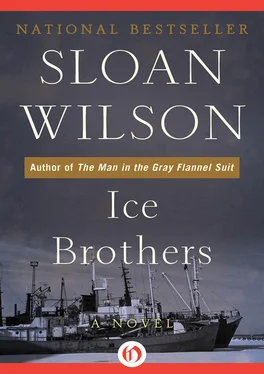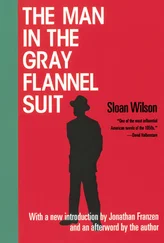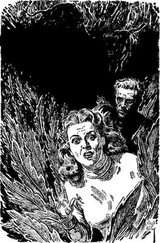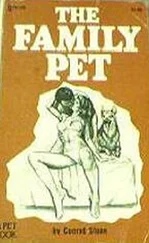“Let’s face it, it would do me some good if we can do this guy a favor,” Paul continued. “He’s an assistant to the district Coast Guard officer and I’m trying to get a commission. As an officer I’ll get maybe five times the pay I’d get if I enlisted.”
There was a pause before she said, “The Hendersons have an apartment over their garage. It’s been empty since their chauffeur quit. They’re not planning on hiring another.”
“Please call them right away,” Paul said. “I’ll call you back in five minutes.”
“How much rent will these people pay?”
“The guy’s a serviceman. Tell the Hendersons that this is a matter of patriotism. Maybe the guy can pay fifty a month, not much more. Call right away. There’s a crowd trying to get into this phone booth.”
Actually, the people waiting in line did not seem restless. They all had drinks in their hands and were watching with appreciative interest a sailor who was giving his girl such a hearty and prolonged embrace that he would have been evicted from the bar in peacetime.
While he waited five minutes Paul sat with the receiver to his ear to show he had a right to remain in the telephone booth. Finding that he had no more nickels, he conquered a feeling of waste and inserted a dime. His mother-in-law answered immediately.
“The Hendersons say they’ll take him if you’ll absolutely vouch for his character.”
“I vouch for it. How much rent do they want?”
“They’ll need sixty a month if they’re going to pay for the heat.”
“It’s a deal. Give me their name, their address and their number.”
This time Paul had to put a quarter into the telephone, an extravagance that hurt him deeply. Christiansen answered immediately.
“This is your expediter,” Paul said. “I got you a garage apartment in Wellesley. Nice section. Sixty bucks a month, heated. Do you want it?”
“God, do I want it! I was going to send my wife and baby back to New London. I can’t thank you enough!”
“Just send me the forms and answer me one question,” Paul said. “If I have all the qualifications, what happens? What’s the timetable?”
“You’ll take a twelve-hour examination in navigation and seamanship at M.I.T. on February second. If you pass that, you’ll be wearing an ensign’s uniform by April. What’s the address of this apartment?”
Paul gave it to him and added, “It’s only about a block from where I live. If you have any trouble give me a call.”
“Is the place furnished?”
“Yes,” Paul replied, though he wasn’t dead sure. “Anyway, it will be easy to get everything together. The Hendersons are nice people.”
He didn’t really know the Hendersons, but he figured they must be nice people if they were friends of Lucy and Erich.
“That’s great,” Christiansen said. “Look, everything’s so jammed up around here that it would be days before we got your forms in the mail. I’ll stick them in my pocket and bring them to the Henderson house tonight. Drop in maybe at about seven and we can have a drink.”
And so that was the way Paul got a commission in the Coast Guard as quickly as he did. There were a few people who said he used pull and political pressure, but all he did was to get a guy an apartment and study like hell for six weeks to pass the twelve-hour examination.
The speed with which Paul made all these arrangements bewildered Sylvia. All her classmates, after all, were planning to finish their college year before entering the service. “You’d think you just can’t wait to leave me,” she said reproachfully in their bedroom one night after they had made strangely unsatisfactory love.
“You know that isn’t it at all.”
“Well, what is it then?”
He found it difficult to give an answer except to cite patriotism, which he knew would be mostly a lie. He wanted to help defend his country, all right, but he wasn’t really in such a great rush to get out there where the shells were flying and the hurricanes were blowing. No, the truth was that naive though it might sound, there was a lot of joy involved in getting a commission. For one thing, he found that temporarily, at least, he would outrank his condescending older brother. While training to be an army air force pilot, Bill would be an enlisted man, while as an ensign Paul would be the equivalent of a second lieutenant. If they ever met in uniform, which Bill’s assignment to flight instruction would probably make unlikely, tall Harvardman Bill would have to salute his miserable little Boston University brother. It was obviously wrong to feel glee about that, but Paul did anyway.
It was also true that the war, whatever horrors it might hold for him, was getting him away from a lot of things he hated. Most of all, his own confusion about his marriage, his career and everything else. This confusion, he realized, was by no means entirely Sylvia’s fault. It had started, so far as he could understand, when he was fifteen years old and his family had moved from the big house in Boston to the cottage in Milton. The old yawl on which he had spent the happiest summers of his life had been left under cover in the shipyard and had not been sold only because his father was insulted by the only kind of price she could bring during those Depression years. Right before his eyes, his father changed from a big exuberant stockbroker and yachtsman to a hesitant old man who sat all day in his “studio” puttering with paint brushes or whittling chains out of wood. His business failure was never discussed by the family, and this silence increased its terror.
Paul and his brother, who was three years older, reacted to this debacle in different ways. Bill got a football scholarship at Harvard, earned his degree in only three years, and got a scholarship at the business school. Big, brash and self-confident, Bill never even gave the appearance of working hard to win his victories.
What Paul did at the age of fifteen was quite different. He hated athletics and his studies at Milton Academy and, when he could not get a scholarship, was the first to suggest that he go to the local high school. The only thing he really loved was boats, and he spent a lot of time helping his father to paint and varnish the old yawl to prepare her for a customer who would appreciate her already antique grace. He also loved girls — hopelessly. Almost as far back as he could remember he had been secretly infatuated with one or another of the girls at his school or at the Boston Yacht Club.
When he was sixteen Paul discovered something else he liked: money. Money was such a tortuous subject in his home that like failure and sex, it could never be discussed openly. The discovery that he could actually make money himself instead of asking his mother for quarters came to Paul as a revelation and a liberation.
He made his first dollar, ten dollars in fact, when he varnished the combing of a Wee Scot at the yacht club. He had simply been trying to make himself valuable as a crew, and he was astonished when the owner gave him a ten-dollar bill. The first thing he did after that was to put a notice up on the club bulletin board offering his services. During the summer he had all the work he could do, and that fall he got the idea of taking spars, oars, and rudders back to his garage and cellar for refinishing.
Soon he found that he could sell magazine subscriptions, wash cars, and sell magic tricks at school for more than he paid for them. Later he discovered that he could sell clothes from a local tailor to his classmates. There was no mystery about money — there was an infinite number of ways in which it could be made. He started a savings account.
“You take after my father,” his mother said proudly. “He was always a wonderful businessman.”
Читать дальше












